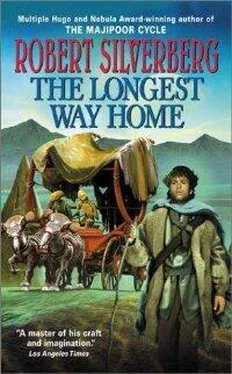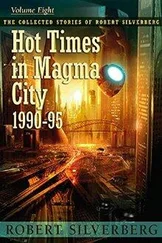News of Joseph’s healing powers had preceded him here. The villagers seemed prepared to pay a heavy bounty for him, for they had filled one entire room of a building on the plaza with treasures to offer: not just the usual fur mats and beaded necklaces, but great branches of blue coral from the eastern sea, and pouches of polished turquoise stones, and the vivid blue-and-red feathers of birds of some tropic land far away, and a great deal more. Even so, the negotiations went on for an extraordinarily long time, and they did not seem to be going smoothly. Though they were conducted, as before, mostly with gestures, aided by quick spurts of conversation in what seemed to be a commercial patois using words unknown to Joseph, he could tell by the tone of voice and the looks of unmistakable exasperation that no meeting of minds was occurring. Huddling soaked and miserable while his soon-to-be former owners, Indigenes whose names he had never learned, bargained with these new Indigenes who sought possession of him over the price of his services, Joseph thought at one point that his current masters had found even this enormous pile of goods inadequate. It looked very much as though they were going to break off the discussion and set out for some village other than this before he had even had a chance to get dry.
Well, if they did, so be it, as long as the village that they would be taking him to was one that brought him closer to his home. But what if—it was his old, constant fear—they simply hauled him back to their own town and kept him as a permanent fixture there?
That did not happen. As abruptly as the dry season had given way to the rain, the contending hagglers reached an agreement and Joseph’s transfer was consummated. Staggering under mats and necklaces and coral branches and all the rest, his sellers went off in the rain to their wagon and his buyers crowded round him for what was becoming the familiar tribal welcome.
These people wanted Joseph not only to heal their sick but to bring holy blessings to the food supplies that they had stored away during the harvest season. In a kind of weird pantomime they led him to their granaries and acted out a description of what it was they wanted him to do, until at last he said impatiently, “You can say it in words. I do understand your language, you know.”
But that seemed to bewilder them. They continued to point and nod and jerk their heads at him.
“Can’t you understand what I’m saying?” he asked.
Maybe they spoke some dialect here so different from the Indigene he had learned in Keilloran that they regarded him as speaking some foreign language. But he saw he was wrong: he heard them talking among themselves, and the words they were using were, in general, understandable enough. Finally he did succeed in getting them to address him directly. It was as though they did not want to speak with him. His using their language made them uncomfortable. This village must not have had much contact with Masters, or with Folk either, for that matter, and looked upon him as some sort of alien thing, which had come their way as a kind of gift of the gods but which was not to be regarded in any way as fit to hold converse with. It was another step in his depersonalization, Joseph thought. As he moved southward he was getting farther and farther from the sort of existence he had had in the village of the Ardardin. Back there he had not had any such sense of solitude, of lostness, of thing ness, as he was beginning to feel down here.
But it was important to bear in mind that he was getting closer to home all the time, though he knew that Keilloran and its House were still a tremendous distance away.
He had no objection to blessing their food supply, if that was what they wanted him to do. Joseph had long since ceased to care what sort of hocus-pocus he performed for the sake of earning his passage to the Southland. Just as at the beginning, in that time only a few months earlier when he was much more naive than he had since become, he had felt it was some obscure violation of his honor as a Master to pretend to know anything about medicine, and that had very quickly ceased to be an issue for him, so too now, if the folk here wanted him to play the role of a demigod, or of a demon, or of anything else that might suit their needs, he was quite willing to do it. Whatever got him homeward: that was his new motto.
And so he let himself be taken into their storage-houses, to their bins of grain and berries and their hanging sides of drying meat and their casks of wine and all the rest that they had laid down for their use in the coming winter, and he threw back his shoulders and raised his head toward the heavens and held up his hands with his fingers outspread, and he cried out anything that came into his mind. “Cailin, Rickard, and Eitan, bless this food! In the name of Kesti and Wykkin and Domian, may virtue enter this food! I call upon Balbus! I call upon Anceph! I call upon Rollin!” He called upon the great ones of Old Earth, too, Agamemnon and Caesar and Genghis Khan, Napoleon and Gilgamesh. What harm did it do? These bins of grain would be none the worse for it. And this village had paid a high price for him: he must try to make them feel they had had their money’s worth.
I am becoming a terrible hypocrite, Joseph thought.
And then he thought, No, I am simply growing up.
He examined that little interchange with himself often during the long rainy days ahead, as he twisted dislocated joints back into place and soothed sprains and stitched cut flesh together and made important-looking holy passes in the air over the prostrate forms of Indigenes who were suffering from ailments that he could not diagnose. I am simply growing up. Throughout much of his adolescence he had wondered what it would be like to be grown up. He knew that he would change, of course. But how? What would he learn? What would he forget? How much of his present self would he remember, when he was a man like his father, carrying the responsibilities that men like his father carried? Would he become hard and cruel, like so many of the adults he had observed? Do foolish things? Make needless enemies?
Well, now he was growing up very fast, and growing up seemed to involve putting aside all the lofty Master ideals that his father had taught him by example and Balbus by direct precept, and simply doing whatever he had to do, day by day, in order to survive. Otherwise, he was not going to get to grow up at all. However much future he was going to have would depend to a great extent on how resourceful he showed himself to be on this strange, unexpected journey across unknown Manza.
It rained virtually every day, the whole time he was in this village. By the time they decided they had earned back the price they had paid for him and were ready to sell him to the next tribe down the road, rivers were leaping their banks and meadows had turned to marshes. But the rain did hold off on the day of his next transfer. Once again he rode in an open cart down a cobbled Indigene road.
The gray sky gave him little clue to the position of the sun, but he seemed to be going south: at least, he hoped so. Joseph had long ago lost track of how much time had passed since the wild night of his escape from Getfen House, nor did he have any notion of the distance he had covered in this series of jolting cart-rides from village to village. He hoped that he was out of High Manza by now and somewhere down in the central part of the continent, but the Indigenes neither would nor could give him any help in determining that, and the reference books he had with him afforded no useful information, other than to tell him that the central part of the continent was mountainous.
That was good news, because he did seem to be coming into higher country. He saw bare serrated hills off to the west, and what seemed like higher peaks behind them. The air was colder, too. Each day was a little chillier than the one preceding. Joseph had never experienced really cold weather before. In his region of the Southland a kind of eternal mild springtime prevailed, all the year round. He had managed to obtain new linen robes from one of the Indigene villages to replace the shredded and tattered clothes he had been wearing since the start of his journey, but Indigenes did not appear to be very sensitive to changes in temperature, and the fabric was light stuff, ill suited to a winter journey. Speaking in the grammar of a supplicant, he was able to get them to give him more, but, even wearing double and triple thicknesses, he found himself shivering most of the time.
Читать дальше












